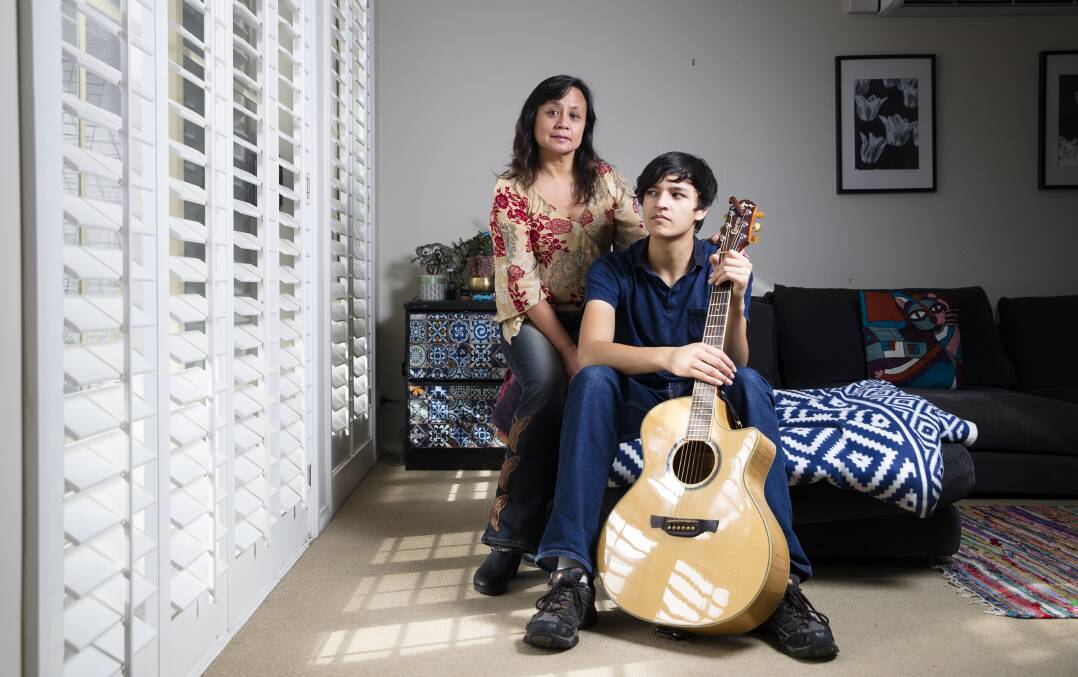
When Eilleen Eugenio's son, Sean, 17, waited for more than 10 hours for surgery, only to be told to come back the next day, she knew she had to stand up for him.
Sean required surgery after he injured his hand in a bike accident. On the day of his surgery Sean had to be at the hospital by 7am and he needed to fast for 12 hours beforehand.
Ms Eugenio decided she would offer moral support by also fasting.
But as the day dragged on, with people coming and going, Sean had not been seen. At about 5.30pm, nearly 24 hours after he started fasting, he was told that he would have to come back the next day.
Ms Eugenio said she took Sean to a Thai restaurant and told him to eat as much as he could in the hour-and-a-half window.
The next day, Ms Eugenio decided to offer a different kind of support to her son. She did not fast on the second day but rather she decided to stand in the waiting room until Sean was seen.
"By sitting down we were not seen. I felt like the most important thing I could do for my son was to literally stand up for him. I'm standing there so whenever anyone walks past and says you can sit down, I can then say, 'it's OK, I can stand'," she said.
"[I can say] 'I'm here waiting for my son, this is his name, we are waiting for this surgery' ... to have people being constantly reminded, rather than my son being shoved down the line."
Sean finally had his surgery at about 12pm. But following his surgery, Ms Eugenio said she had to wait longer because paperwork was not ready. When she asked about it, staff said they would send it but Ms Eugenio was determined to wait as it was crucial to Sean starting rehabilitation on time.
As a talented musician, Sean needed to start rehabilitation as quickly as possible to ensure there was no long-lasting damage.
Ms Eugenio recognised that surgery delays sometimes happened but she couldn't understand why Sean had to fast for an entire day only to not be seen and told he would have to restart that fast. There were no guarantees that he would be seen the next day.
She said Sean's experience highlighted systemic issues within the territory's health system, especially since it was remarked to her it was a common occurrence.

Thankfully, months after the surgery, Sean's hand is almost recovered and he is back to playing his guitar.
But The Canberra Times has heard from others who have had to wait for days before being seen for surgery, fasting on each of those days.
Last week, Dilpreet Grewal's daughter, Savleen, had to wait five days before receiving surgery on her knee, which she had injured at school. A bone fragment had fallen off her knee and surgery was needed to repair it.
Savleen was put on the waiting list for surgery the day after the injury occurred. She had to fast from 5.30am and was in the waiting room until 5.30pm, when staff finally told her they were unable to do the surgery and she would have to come back.
Surgery was unable to happen the next day, and the following day Mr Grewal did not hear anything until he called the hospital switchboard at 8pm.
Savleen was put on the waiting list for the next two days but her surgery was deferred on both days.
The surgery finally happened last Tuesday, five days after her injury had occurred.
"It has been a very disappointing, frustrating and extremely painful experience," Mr Grewal said.
"I even offered to go private if the public system is failing but I was told there was no private system for kids and I can choose to seek a referral to a specialist of my choice from my GP [but] I would be at the mercy of the specialist to give me an appointment in the next one to two weeks."
Mr Grewal said the experience left him with many questions about the system. He said he questioned why there was no person on the floor to explain the triage of patients. He said nurses were left to explain why patients couldn't be looked at.
"There is no accountable person on the floor who can take responsibility of the decisions made about triage of patients or that of making sure enough doctors are on floor to meet the demand. Why this is the case?"
As the health system comes under increasing pressure, elective surgeries have been postponed. An average of 11 surgeries a day have had to be delayed as entire theatres have had to close. Canberra Health Services has acknowledged the frustrations around these delays.
Staffing shortages have also plagued Canberra's health system over recent months. On average there are about 150 staff off each day due to illness.
Ms Eugenio stressed that she did not blame the staff.
"It's not the staff, I could see they were trying their hardest in an environment where they were not properly resourced, they were obviously understaffed," she said
"They're so important for all of Canberra and we just need to stop the consultant reports ... the problem is that they are working under a really stressful environment and they need to be more supported, that needs to be addressed as opposed to sending them on another course."
Opposition health spokeswoman Leanne Castley said she had heard of many similar stories and said staffing issues needed to be addressed.
"These are appalling stories that we are hearing from many different people across Canberra. We've got patients in distress and their carers are showing courage to stand up for them to make sure that everything goes well on the day of their surgeries," she said.
"There is no excuse for failing to properly plan to ensure there are adequate staffing levels so that's not an excuse. This is our health system."
Heath Minister Rachel Stephen-Smith was recently asked about the delays in question time, with the opposition specifically pointing to Sean's situation.
While she could not comment on the individual circumstances, she said she often received messages from people in similar situations. She said it was concerning but said it happened due to people needing emergency surgery.
"I do get regular representations from people who have had the experience of waiting for their elective surgery, having attended the emergency department, been sent home and told to come back for their surgery," she said.
"Sometimes it is the case that urgent emergency surgery does come in, and unfortunately it has to take priority over the people who have returned for their emergency surgery that could be delayed somewhat, or for their elective surgery; then those people, unfortunately, have their surgery delayed.
"It is really distressing when this happens. I am always really concerned to hear about this.
"Canberra Health Services is doing some work around how to better manage that process. Unfortunately, it is sometimes the case that people are unable to get their surgery because more urgent matters, where people really need lifesaving or limbsaving surgery, do come first."
We've made it a whole lot easier for you to have your say. Our new comment platform requires only one log-in to access articles and to join the discussion on The Canberra Times website. Find out how to register so you can enjoy civil, friendly and engaging discussions. See our moderation policy here.







